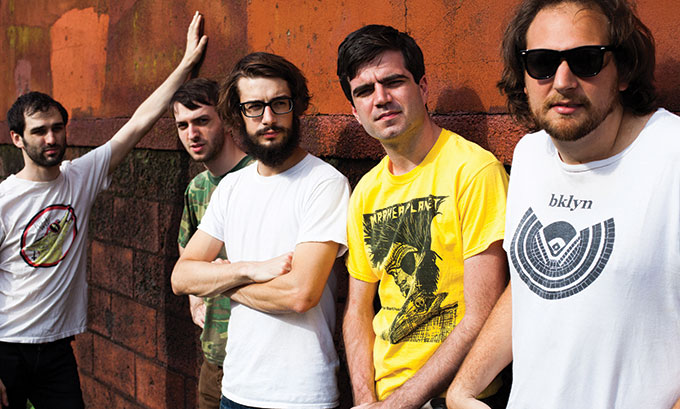Titus Andronicus Kicks Off its Next Tour at The Tralf on Monday
by Cory Perla

Road-Ready
It was like joining a conversation mid-thought. As if it began well before I punched his digits into my phone and would continue long after we hung up. Consumerism, capitalism, existential questions about meaning, ambition, and control were topics I wanted to talk about, topics that many people want to talk about these days, but few, including myself, are able to articulate properly. But Patrick Stickles of punk band Titus Andronicus was able to articulate these subjects quite well on the band’s latest record, 2012’s Local Business.
Of course, music was a topic of choice too—the next Titus Andronicus record to be exact.
The list of questions I had to ask Stickles quickly went out the window when the extroverted frontman picked up the phone and dove straight into his band’s tumultuous history, their future potential, and their current creative state.
“I want to ask you about your new record,” I said, in my mind referring Local Business, an indie-rock record with a serious punk rock ethos that celebrates the DIY punk scene and examines freedom, consumerism, and a prevailing us vs. them mentality that most indie rock bands fail to even gloss over these days.
“Not many people know about that. If you catch me in a loquacious mood right now you could get many exclusives,” he said, referring to the unfinished, untitled followup to Local Business, which the band is currently working on. By the sound of Stickles’s voice and the pace of his speech I could tell he was indeed in a loquacious mood, the type of mood you find people in during a creative peak.
“It’s a double album,” he said, with a tracklisting approaching 30 tracks. He pointed out that all of the last three Titus Andronicus albums combined add up to 29 tracks. “I feel like I’m ready to do it. I’ve got it, I’ve got the tunes, I’ve got the words, I’ve got the team, I’ve got the resources,” he told me.
According to Stickles, the new album will be a rock opera. The band’s second album, 2010’s The Monitor, was also a concept album, loosely based on the Civil War battleship by the same name, so the band isn’t necessarily treading into unfamiliar waters. The new record is still a year away, although Stickles says that audiences will start to hear some of the new tunes sooner than that, around the time when they release an upcoming documentary film about their recent tours.
To understand how Titus Andronicus got to this point, you must start from the beginning. For Stickles, Titus Andronicus has been two different bands. First there was the Jersey-rock band of the mid-2000s. “We were sloppy, stupid, and young and we didn’t know anything,” Stickles said as the sound of an ice cream truck blared in the background. He described the band’s first album, The Airing of Grievances, as an awkward attempt to do something grandiose. “What happened was we had dreams of 100 guitars and a sousaphone, and a xylophone, and a saxophone, and a telephone, and a gramophone, and every kind of phone. It was going to be this grand symphony, but the fact of the matter is that isn’t practical and you can’t do that in every town in America every night.”
On the band’s second album, The Monitor, Stickles says they truly realized the “whole vision of the Jersey-band thing” and pulled off that trick to the ultimate degree. “The first album presented a certain vision of a band from New Jersey of young idiot kids, and the second album actually made that vision a more accessible reality.” Fans and critics alike praised it, but that would be the end of Titus Andronicus’s first act. A shift in vision and a shift in personnel sent Titus Andronicus in a new direction. In 2011, the band basically started anew. Joining Stickles and drummer Eric Harm were bassist Julian Veronesi and guitarist Adam Reich, founder of Brooklyn DIY venue Shea Stadium. With the change of lineup came a move to Williamsburg and the official demise of the original “New Jersey band.” With what Stickles calls the “inauguration of this new era” came a new set of goals and expectations: specifically to create a more “real” record.
“We wanted to make a record that wasn’t just a pretend thing. Neil Young said he’d rather take pictures than paint paintings. He sets up certain situations and creates moments and events, and then documents the moments as they actually occur. If you listen to a Neil Young and Crazy Horse album, it doesn’t sound that different than if you’re standing in the room with them when they’re playing. It’s the same four guys; it’s not pulling the wool over people’s eyes.”
This is what Stickles attempted to do on Local Business and by all measures he succeeded. He pared down the band to the bare essentials and brought the album’s content down to earth with the decision to focus on contemporary affairs and personal issues, including his eating disorder (metaphorically represented as a food fight on “My Eating Disorder”) to create a more grounded, road-ready record. In an era of escapism, the immediacy of Local Business is hard to match.
Titus Andronicus will try the album out on the road again when they kick off their next tour in Buffalo on Monday, August 26, at the Tralf Music Hall, with Brooklyn’s Lost Boy and Buffalo punks the Mallwalkers.
blog comments powered by Disqus
|
Issue Navigation> Issue Index > v12n34 (Week of Thursday, August 22) > Titus Andronicus Kicks Off its Next Tour at The Tralf on Monday This Week's Issue • Artvoice Daily • Artvoice TV • Events Calendar • Classifieds |









 Current Issue
Current Issue